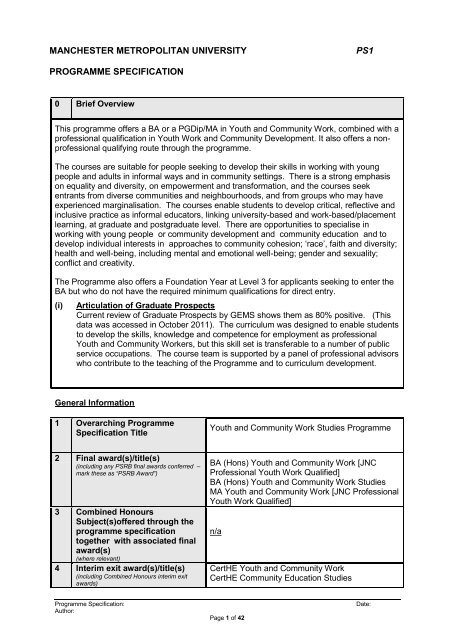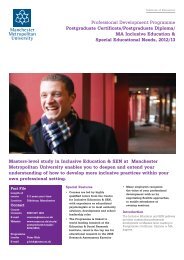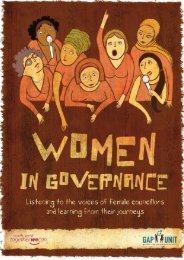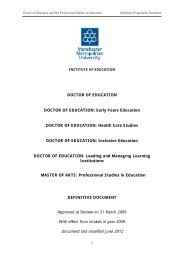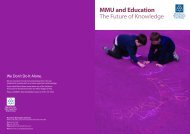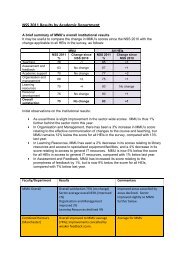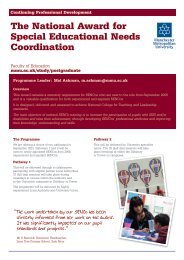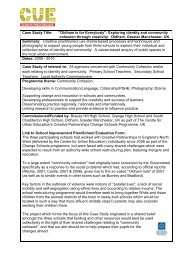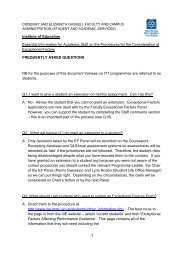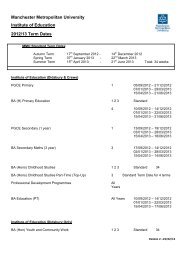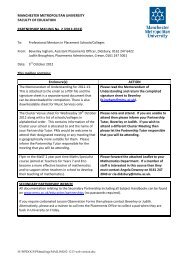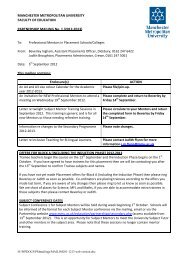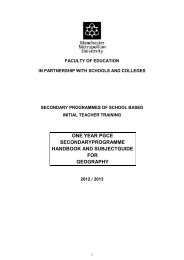THE MANCHESTER METROPOLITAN UNIVERSITY - Faculty of ...
THE MANCHESTER METROPOLITAN UNIVERSITY - Faculty of ...
THE MANCHESTER METROPOLITAN UNIVERSITY - Faculty of ...
Create successful ePaper yourself
Turn your PDF publications into a flip-book with our unique Google optimized e-Paper software.
<strong>MANCHESTER</strong> <strong>METROPOLITAN</strong> <strong>UNIVERSITY</strong>PS1PROGRAMME SPECIFICATION0 Brief OverviewThis programme <strong>of</strong>fers a BA or a PGDip/MA in Youth and Community Work, combined with apr<strong>of</strong>essional qualification in Youth Work and Community Development. It also <strong>of</strong>fers a nonpr<strong>of</strong>essionalqualifying route through the programme.The courses are suitable for people seeking to develop their skills in working with youngpeople and adults in informal ways and in community settings. There is a strong emphasison equality and diversity, on empowerment and transformation, and the courses seekentrants from diverse communities and neighbourhoods, and from groups who may haveexperienced marginalisation. The courses enable students to develop critical, reflective andinclusive practice as informal educators, linking university-based and work-based/placementlearning, at graduate and postgraduate level. There are opportunities to specialise inworking with young people or community development and community education and todevelop individual interests in approaches to community cohesion; ‘race’, faith and diversity;health and well-being, including mental and emotional well-being; gender and sexuality;conflict and creativity.The Programme also <strong>of</strong>fers a Foundation Year at Level 3 for applicants seeking to enter theBA but who do not have the required minimum qualifications for direct entry.(i)Articulation <strong>of</strong> Graduate ProspectsCurrent review <strong>of</strong> Graduate Prospects by GEMS shows them as 80% positive. (Thisdata was accessed in October 2011). The curriculum was designed to enable studentsto develop the skills, knowledge and competence for employment as pr<strong>of</strong>essionalYouth and Community Workers, but this skill set is transferable to a number <strong>of</strong> publicservice occupations. The course team is supported by a panel <strong>of</strong> pr<strong>of</strong>essional advisorswho contribute to the teaching <strong>of</strong> the Programme and to curriculum development.General Information1 Overarching ProgrammeSpecification TitleYouth and Community Work Studies Programme2 Final award(s)/title(s)(including any PSRB final awards conferred –mark these as “PSRB Award”)3 Combined HonoursSubject(s)<strong>of</strong>fered through theprogramme specificationtogether with associated finalaward(s)(where relevant)4 Interim exit award(s)/title(s)(including Combined Honours interim exitawards)BA (Hons) Youth and Community Work [JNCPr<strong>of</strong>essional Youth Work Qualified]BA (Hons) Youth and Community Work StudiesMA Youth and Community Work [JNC Pr<strong>of</strong>essionalYouth Work Qualified]n/aCertHE Youth and Community WorkCertHE Community Education StudiesProgramme Specification:Author:Page 1 <strong>of</strong> 42Date:
5 Mode(s)(only include duration where there is a PSRBrequirement for limited duration )6 FHEQ position <strong>of</strong> final award(s)7 Awarding institution(include PSRBs which confer a joint oradditional qualification on successfulcompletion <strong>of</strong> programme)8 Teaching institution(s)(include collaborative partners whereappropriate – if more than one award inprogramme specification, indicate which aretaught by partner)9 Relationship with FoundationYear(if more than one award in programmespecification, indicate which have links withFoundation Year)DipHE Youth and Community WorkDipHE Community Education StudiesPostgraduate Diploma in Youth and CommunityWork [JNC Pr<strong>of</strong>essional Youth Work Qualified]Postgraduate Certificate in Community EducationStudiesPostgraduate Diploma Community EducationStudiesNB: There is no exit award available at the end <strong>of</strong>the Foundation Year.BA (Hons) Youth and Community Work – full-timeJNC QualifiedBA (Hons) Youth and Community Work Studiesfull-time and part-timePostgraduate Diploma in Youth and CommunityWork – full time and part-time JNC QualifiedMA Youth and Community Work – full- time andpart timeHonours (Level 6)Masters (Level 7)MMUMMUBAPgDip/MASuccessful completion <strong>of</strong> the Institute <strong>of</strong> EducationFoundation Year entitles students entry to BA (Hons) Youthand Community Work.Administrative Details10 Home Department/ School/InstituteSecondary, PCET, Careers Guidance, Youth andCommunity programmes11 Home <strong>Faculty</strong> <strong>Faculty</strong> <strong>of</strong> Education12 UCAS code(s) L523Collaborative Arrangements (where relevant)13 Approved Collaborativepartner(s)(provide name <strong>of</strong> partner(s) and type <strong>of</strong>partnership)Partner NameType <strong>of</strong> CollaborativePartnership14 Other Approved AcademicPartnership(s)(other than collaborative)Partner NameType <strong>of</strong> AcademicPartnershipProgramme Specification:Author:Page 2 <strong>of</strong> 42Date:
Approval Status15 Date and outcome <strong>of</strong> mostrecent MMU review/ approval(i) Latest review/approval17 January 2012Foundation Year – 02 May 2012(ii) Major Modifications to ProgrammeSpecification16 Next Scheduled Review Date: 2017/18Foundation Year will be reviewed at the same time as theEducation Studies Programme (also with a scheduled ReviewDate <strong>of</strong> 2017/18)17 PS/1 effective date:(ie date from which the outcome <strong>of</strong> approval orlast review is effective OR the date fromwhich amendments to the programmespecification are effective)September 2012External References/Relationships18 QAA Benchmark Statement(s) Youth and Community Work19 PSRB(s) associated with finalaward <strong>of</strong> any route within theprogramme specification(ie those which <strong>of</strong>fer pr<strong>of</strong>essionalstatus/membership/license to practise asresult <strong>of</strong> successful completion <strong>of</strong> the finalaward as included in the University PSRBdatabase)20 Date and outcome <strong>of</strong> last PSRBapproval(s)National Youth Agency (NYA) for accreditation asa qualified graduate youth and community worker.The awards accredited by the NYA are:BA (Hons) Youth and Community WorkPG Dip Youth and Community Work [interim exitaward]. Pr<strong>of</strong>essional accreditation is granted atPG Dip level.June 2009 to 2014Programme Information21 University and Programme Educational Aims(i) University Educational AimsTo develop flexible approaches to programme delivery and student support whichreflect the needs and expectations <strong>of</strong> our students.To provide a supportive and inclusive learning environment which will enable successfor all learnersTo encourage the development <strong>of</strong> students’ intellectual and imaginative powers,creativity, independence, critical self-awareness, imagination and skills that willenhance global employment opportunities on graduation in all programmes.To establish a culture <strong>of</strong> constant improvement in learning, teaching and assessmentthat is anticipatory, enabling, supportive, rewarding and fully aligned with theUniversity’s vision and strategic objectives.To provide a learning experience that is informed by research, scholarship, reflectivepractice and engagement with industry and the pr<strong>of</strong>essions.Programme Specification:Author:Page 3 <strong>of</strong> 42Date:
MMU Programme Specification:(Insert Programme Specification Title)__________________________________________________________________________________________(ii) Programme Educational AimsTo provide a programme leading to pr<strong>of</strong>essional recognition in youth work andcommunity development at BA and MA level, as recognised by the National YouthAgency, and the JNC for Youth and Community workers.To provide opportunities through an appropriate range <strong>of</strong> teaching and learningmethods in both university and practice contexts for students to develop competenceto work with the knowledge, skills, feelings, attitudes and values which support theirdeveloping pr<strong>of</strong>essional practice as informal educators.To enable the development <strong>of</strong> practitioners who are able to theorise their practice andground their theoretical understandings in a multi-pr<strong>of</strong>essional context <strong>of</strong> policy andpractice.To enable students to achieve a clear sense <strong>of</strong> pr<strong>of</strong>essional identity from which tonegotiate the complex ethical and practice dilemmas with which informal educatorsare engaged.22 Final Learning OutcomesMMU Educational OutcomesOn successful completion <strong>of</strong> their course <strong>of</strong> study MMU graduates will be able to:apply skills <strong>of</strong> critical analysis to real world situations within a defined range <strong>of</strong>contextsdemonstrate a high degree <strong>of</strong> pr<strong>of</strong>essionalism characterised by initiative, creativity,motivation and self managementexpress ideas effectively and communicate information appropriately and accuratelyusing a range <strong>of</strong> media including ICT,develop working relationships using teamwork and leadership skills, recognising andrespecting different perspectivesmanage their pr<strong>of</strong>essional development reflecting on progress and taking appropriateactionfind, evaluate, synthesise and use information from a variety <strong>of</strong> sourcesarticulate an awareness <strong>of</strong> the social and community contexts within their disciplinaryfieldProgramme Specific Outcomes(i)Final Award Learning OutcomesInclude all final learning outcomes for all named routes/exit awardsFor BA (Hons) Youth and Community Work, On successful completion <strong>of</strong> their course <strong>of</strong>study graduates will be able to:Programme Specification:Author:Page 4 <strong>of</strong> 42Date:
MMU Programme Specification:(Insert Programme Specification Title)__________________________________________________________________________________________i. achieve pr<strong>of</strong>essional recognition in youth work and community development,negotiating a complex and contested domain <strong>of</strong> practice with a clear sense <strong>of</strong>pr<strong>of</strong>essional identity.ii. investigate and negotiate ethical dilemmas with clear reference to an ethic <strong>of</strong> humanrights, responsibilities, and a commitment to care and human flourishing.iii. work effectively in Youth and community work with due attention to the principles andpractice <strong>of</strong> informal learning and community development, <strong>of</strong> personal and peergroup development, active citizenship, and <strong>of</strong> issues in the management, leadershipand support <strong>of</strong> community-based organisations and networks.iv. work independently in both University and pr<strong>of</strong>essional contexts, drawing on researchskills to work analytically on primary and secondary sources <strong>of</strong> evidence, critiquing‘taken for granted’ pr<strong>of</strong>essional common sense when necessary.v. communicate fluently, both interpersonally and through written modes <strong>of</strong>communication, in ways which recognise the multiple roles and accountabilities <strong>of</strong>informal educators.vi. select from a range <strong>of</strong> intellectual, cultural, physical and emotional resources andskills to support their practice.B.A. (Hons) Youth and Community Work StudiesLearning OutcomesCandidates achieving this award will build on an existing recognised pr<strong>of</strong>essionalqualification in youth and community work at DipHE Level to achieve an Honours degree.On successful completion <strong>of</strong> their course <strong>of</strong> study graduates will be able to:i. Engage critically with debates at the forefront <strong>of</strong> the discipline, negotiating a complexand contested domain <strong>of</strong> practice with a clear sense <strong>of</strong> pr<strong>of</strong>essional identity.ii. investigate and negotiate ethical dilemmas with clear reference to an ethic <strong>of</strong> humanrights, responsibilities, and a commitment to care and human flourishing.iii. work independently in both University and pr<strong>of</strong>essional contexts, drawing on researchskills to work analytically on primary and secondary sources <strong>of</strong> evidence to achieve asecure and grounded understanding <strong>of</strong> their pr<strong>of</strong>essional interventions.iv. evaluate the limits and potential <strong>of</strong> the role <strong>of</strong> informal educator in contributing tochange, transformation and empowerment in relation to the nature <strong>of</strong> changeprocesses at a personal and societal levelv. analyse the theoretical basis <strong>of</strong> practice interventions.vi. Select from a range <strong>of</strong> intellectual, cultural, physical and emotional resources andskills to support their practice.PG/Dip in Youth and Community Work:On successful completion <strong>of</strong> their course <strong>of</strong> study graduates will be able to:i. achieve pr<strong>of</strong>essional recognition in youth work and community development,negotiating a complex and contested domain <strong>of</strong> practice with a clear sense <strong>of</strong>pr<strong>of</strong>essional identity.ii. investigate and negotiate ethical dilemmas with clear reference to an ethic <strong>of</strong> humanrights, responsibilities, and a commitment to care and human flourishing.iii. work independently in both University and pr<strong>of</strong>essional contexts, drawing on researchskills to work analytically on primary and secondary sources <strong>of</strong> evidence, critiquingreceived ‘taken for granted’ pr<strong>of</strong>essional attitudes where necessary.iv. analyse the theoretical basis <strong>of</strong> practice interventions.Programme Specification:Author:Page 5 <strong>of</strong> 42Date:
MMU Programme Specification:(Insert Programme Specification Title)__________________________________________________________________________________________v. Select from a range <strong>of</strong> intellectual, cultural, physical and emotional resources andskills to support their practice.vi. critically engage in debates concerning the links between policy practice andpr<strong>of</strong>essional autonomy and accountability at the forefront <strong>of</strong> the study <strong>of</strong> youth work,community education and community development.vii. Demonstrate originality in the development <strong>of</strong> knowledge in the field <strong>of</strong> youth work,community education and community development, responding to complex issuesboth systematically and creatively.MA in Youth and Community WorkOn successful completion <strong>of</strong> their course <strong>of</strong> study graduates will be able to:i generate questions and new understandings <strong>of</strong> well-established debates concerningevidence-based policy and practice..ii deal with complex issues both systematically and creatively, showing originality intackling pr<strong>of</strong>essional questions.iii recognise and analyse the congruence between research methods and pr<strong>of</strong>essionalpractice in youth work, community development.Learning Outcomes for the Programme in Practice SettingsIn practice settings students will be able to:Engage and communicate positively with young people and adults in localcommunitiesfacilitate the personal, social and educational development <strong>of</strong> young peopleenable young people and adults to make active and confident contributions to theircommunitiesfoster democratic practicepromote equality and safeguarding young people’s interests and welfarecontribute to empowerment and processes <strong>of</strong> transformation with young people andcommunitiesrespond to diversity, creating inclusive learning environments and developing bridgebuildingstrategies and networksbuild capacity by maintaining and developing organisations which support youth andcommunity work practicelead and manage teams and individuals including in multi-agency contextsplan, monitor and evaluate pr<strong>of</strong>essional practicepursue their own self-development and continuous pr<strong>of</strong>essional development ascritical and reflective practitioners.(ii)Combined Honours Learning OutcomesNot applicable(iii)Pass Degree Learning OutcomesStudents will:i. be able to apply their learning in pr<strong>of</strong>essional contexts and evaluate the knowledgethey have gained.Programme Specification:Author:Page 6 <strong>of</strong> 42Date:
MMU Programme Specification:(Insert Programme Specification Title)__________________________________________________________________________________________ii. be able to investigate and negotiate ethical dilemmas with clear reference to an ethic<strong>of</strong> non-discrimination, rights, responsibilities, and a commitment to care and humanflourishing, which can recognise and challenge unjustified oppression.iii. be able to work independently in both University and pr<strong>of</strong>essional contexts, drawingon research skills to work analytically on primary and secondary sources <strong>of</strong> evidenceto achieve a secure and grounded understanding <strong>of</strong> their pr<strong>of</strong>essional interventions.iv. be able to articulate re theoretical basis <strong>of</strong> practice interventions.v. Be highly competent communicators, both interpersonally and through written modes<strong>of</strong> communication, in ways which recognise the multiple roles and accountabilities <strong>of</strong>informal educators.vi. Know how to draw on a range <strong>of</strong> intellectual, cultural, physical and emotionalresources and skills to support their practice.Foundation Year Learning OutcomesIt is recognised that the University’s General Educational Outcomes will be met in full on completion <strong>of</strong>the total student experience over the period <strong>of</strong> study towards a degree. On successful completion <strong>of</strong>the University Foundation Year a student will be able to: Demonstrate knowledge in the subject matter <strong>of</strong> their units appropriate to Level 3 and applywhat has been learned; Engage in discussion on topics/issues related to contemporary debate in the subject matter <strong>of</strong>their units; Demonstrate safe and effective use <strong>of</strong> specific media/equipment/material where appropriate; Extract, summarise and synthesise relevant information; Produce a coherent and structured piece <strong>of</strong> written work; Demonstrate a readiness for lifelong learning and personal development; Participate effectively in group working and team activities; Demonstrate communication and presentation skills by clear and effective use <strong>of</strong> speech,writing and other appropriate methods; Demonstrate a basic level <strong>of</strong> critical thought; Apply a range <strong>of</strong> study skills methods to enhance their academic development; Demonstrate numeracy skills in both everyday situations and in their specific subject areaswhere appropriate; Demonstrate basic IT skills relating to word processing, spreadsheets, simple data bases andthe Internet; and Demonstrate an awareness <strong>of</strong> the programme <strong>of</strong> study in a wider context.23 Interim Award Learning Outcomeseg for BA/BSc (Hons) – include Level 4 and 5 but NOT Level 6; for Level 7- PGCert & PGDip but NOT MA/MScInterim Award Learning OutcomesCertHE Youth and Community WorkStudents will be able to:i. demonstrate competence in the study <strong>of</strong> communities as the intellectual basis foryouth and community work with the ability to develop lines <strong>of</strong> argument based on theinterpretation <strong>of</strong> qualitative and quantitative dataii. show understanding <strong>of</strong> youth and community development as informal learning inmulti pr<strong>of</strong>essional contextsiii. demonstrate awareness <strong>of</strong> ethical debates in youth and community workProgramme Specification:Author:Page 7 <strong>of</strong> 42Date:
MMU Programme Specification:(Insert Programme Specification Title)__________________________________________________________________________________________iv.recognise and develop strategies for their own pr<strong>of</strong>essional development andlearning and identify appropriate personal emotional and intellectual resourcesCertHE Community Education StudiesThis award is for students who have achieved 120 credits but they have not achieved thelearning outcomes related to practice.Students will be able to:i. demonstrate competence in the study <strong>of</strong> communities as the intellectual basis foryouth and community work with the ability to develop lines <strong>of</strong> argument based on theinterpretation <strong>of</strong> qualitative and quantitative dataii. show understanding <strong>of</strong> youth and community development as informal learning inmulti pr<strong>of</strong>essional contextsiii. demonstrate awareness <strong>of</strong> ethical debates in youth and community workDipHE Youth and Community WorkStudents who have achieved the DipHE in Youth and Community Work award will be able to:i. demonstrate competence in the study <strong>of</strong> communities as the intellectual basis foryouth and community work with the ability to develop lines <strong>of</strong> argument based on theinterpretation <strong>of</strong> qualitative and quantitative dataii. show understanding <strong>of</strong> youth and community development as informal learning inmulti pr<strong>of</strong>essional contextsiii. demonstrate awareness <strong>of</strong> ethical debates in youth and community workiv. recognise and develop strategies for their own pr<strong>of</strong>essional development andlearning and identify appropriate personal emotional and intellectual resourcesv. apply and evaluate knowledge they have gained <strong>of</strong> informal learning in academicstudy <strong>of</strong> communities and community development, <strong>of</strong> youth work, personal andsocial education, <strong>of</strong> political and citizenship education, and <strong>of</strong> management andsupervision in community-based organisationsvi. have applied this knowledge in the context <strong>of</strong> a block placement in a pr<strong>of</strong>essionalpractice setting <strong>of</strong> at least twelve weeks duration.vii. be able to work as reflective practitioners.DipHE Community Education StudiesThis award is for students who have achieved 120 credits but they have not achieved thelearning outcomes related to practice.Students will be able to:i. demonstrate competence in the study <strong>of</strong> communities as the intellectual basis foryouth and community work with the ability to develop lines <strong>of</strong> argument based on theinterpretation <strong>of</strong> qualitative and quantitative dataii. show understanding <strong>of</strong> youth and community development as informal learning inmulti pr<strong>of</strong>essional contextsiii. demonstrate awareness <strong>of</strong> ethical debates in youth and community workiv. recognise and develop strategies for their own pr<strong>of</strong>essional development and learningand identify appropriate personal emotional and intellectual resourcesv. apply and evaluate knowledge they have gained <strong>of</strong> informal learning in academicstudy <strong>of</strong> communities and community development, <strong>of</strong> youth work, personal andProgramme Specification:Author:Page 8 <strong>of</strong> 42Date:
MMU Programme Specification:(Insert Programme Specification Title)__________________________________________________________________________________________social education, <strong>of</strong> political and citizenship education, and <strong>of</strong> management andsupervision in community-based organisationsPostgraduate Certificate in Community Education StudiesThis award is for students who have achieved 60 credits at Level 7 but have not achieved anappropriate standard in pr<strong>of</strong>essional practice for the Pr<strong>of</strong>essional Award.Students will be able to :i. critically engage in debates concerning the links between policy practice andpr<strong>of</strong>essional autonomy and accountability at the forefront <strong>of</strong> the study <strong>of</strong> youth work,community education and community development.Postgraduate Diploma Community Education StudiesThis award is for students who have achieved 120 credits at Level 7 but have not succeededin achieving an appropriate level <strong>of</strong> pr<strong>of</strong>essional practice for the award <strong>of</strong> the PGDip Youthand Community Work.Students will be able to:i. critically engage in debates concerning the links between policy practice andpr<strong>of</strong>essional autonomy and accountability at the forefront <strong>of</strong> the study <strong>of</strong> youth work,community education and community development.ii. Demonstrate originality in the application <strong>of</strong> knowledge in the field <strong>of</strong> youth work,community education and community development.iii. critically evaluate and respond to complex issues both systematically and creatively,and they will show originality in tackling and solving problems.Pg/Dip Youth and Community Work Interim Learning OutcomesStudents will be able to:i. critically engage in debates concerning the links between policy practice andpr<strong>of</strong>essional autonomy and accountability at the forefront <strong>of</strong> the study <strong>of</strong> youth work,community education and community development.ii. Demonstrate originality in the application <strong>of</strong> knowledge in the field <strong>of</strong> youth work,community education and community development.iii. critically evaluate and respond to complex issues both systematically and creatively,and they will show originality in tackling and solving problems.iv. achieve and demonstrate skills, knowledge and understanding sufficient to achievepr<strong>of</strong>essional recognition in youth and community work, as recognised by the NationalYouth Agency.24 Teaching/Learning and Assessment Strategy(i) Curriculum DesignPrinciples and ValuesProgramme Specification:Author:Page 9 <strong>of</strong> 42Date:
MMU Programme Specification:(Insert Programme Specification Title)__________________________________________________________________________________________The education and training <strong>of</strong> Youth and Community Workers is concerned with thedevelopment <strong>of</strong> students’ understanding, knowledge, attitudes feelings and skills. Thepr<strong>of</strong>essional practice <strong>of</strong> youth and community work encourages the seeking <strong>of</strong> explanationsfor social inequalities through collaborative enquiry and the development <strong>of</strong> inclusive,democratic and participatory approaches. It requires the ability to create strategies forintervention, development and change, which have meaning and purpose both for individualsand groups. Teaching, learning and assessment strategies need to be congruent with thepr<strong>of</strong>essional practice <strong>of</strong> informal education in which the programmes <strong>of</strong>fer a pr<strong>of</strong>essionalformation. The teaching and learning strategies on the programme relate explicitly thereforeto principles <strong>of</strong> popular community education, including global perspectives and to theprinciples <strong>of</strong> informal learning in youth work.Learning, teaching and assessment strategies on the programme reflect the values, ethicalprinciples and codes <strong>of</strong> practice that underpin the pr<strong>of</strong>ession roles which graduates willperform. They are based on a framework for quality drawn from national guidelines (QAAYouth and Community Work Benchmark Statement, QAA Code <strong>of</strong> Practice for PlacementLearning; National Qualifications Framework), institutional strategies (The ManchesterMetropolitan University’s General Educational Aims, as well as the Employability andSustainability strategies. The Threshold Standards for Student Experience ) and NationalStandards set by the relevant pr<strong>of</strong>essional bodies such as the Education and TrainingStandards Committee <strong>of</strong> the National Youth Agency.The programme is designed to be flexible in the ways in which work-based learning is<strong>of</strong>fered in order to encourage trainees’ participation in learning whilst operating in thepractice area, and key units at each level draw on a mixture <strong>of</strong> work-based learning,University-based learning sets and supported e-learning/workbook materials.Learning/Teaching StrategyThe Academic Skills for Higher Education Unit is provided to acclimatise Foundation Yearstudents to HE study.A variety <strong>of</strong> teaching/learning delivery methods and blended learning will be used. This willinclude:Lectures and seminars, including reading seminarsPractice-based learning opportunities including work-based learningExperiential workshopsOpportunities for small group work, mentor pairs and triads, role plays and microskillsworkGuided student-led and self directed studyPortfolio Learning and the use <strong>of</strong> reflective journal, including problem-posing andcritical incident recordingE-learningPractice workbooksThe following features will permeate this broad range <strong>of</strong> teaching/learning delivery methods:an emphasis on inclusive, experiential and participatory learning that values andutilises the richly diversity <strong>of</strong> life and practice experiences which students bring to thelearning environment;a dialogical approach to learning/teaching with learning activities designed toencourage students to adopt an enquiring ‘problem-posing’ and collaborativeapproach to learning;Programme Specification:Author:Page 10 <strong>of</strong> 42Date:
MMU Programme Specification:(Insert Programme Specification Title)__________________________________________________________________________________________opportunities both in classroom and practice-based learning for students to developknowledge, skills, and pr<strong>of</strong>essional competence through achieving a synthesis <strong>of</strong>theory and life/practice experience leading to their development as reflexive,reflective and critical practitioners;Students will be introduced to the use <strong>of</strong> ICT for learning and E-learning will form asignificant aspect <strong>of</strong> a number <strong>of</strong> units on the programme.Increased opportunities will be provided at each stage <strong>of</strong> the course to enable thedevelopment <strong>of</strong> students as independent and autonomous learners. This will largelybe achieved through the early introduction <strong>of</strong> the Portfolio , reflective journal andPersonal Development Planning, carefully managed collaborative and student-ledgroupwork activities, online learning and increasing opportunities for students toparticipate in inquiry and research activities;The provision has scope for meeting the learning requirements <strong>of</strong> all students, takinginto account a wide range <strong>of</strong> learning styles, preferences and abilities <strong>of</strong> studentsfrom diverse social, cultural, educational backgrounds and communities <strong>of</strong>tentraditionally underrepresented in Higher Education. Proactive measures will be takento meet specific student learning requirements to ensure that positive learningopportunities are <strong>of</strong>fered and previous negative educational or life experiences arenot replicated or reinforced;Work-based learning forms a significant aspect <strong>of</strong> the learning throughout thisprogramme <strong>of</strong> study.Work-based learning is developed in partnership with practitioners in youth andcommunity work regionally and occurs at each stage <strong>of</strong> the programme. It includesobservation, structured practice investigations, case studies, project planning, visitsand taster events and work-based study periods. It also includes two significantplacement periods <strong>of</strong> supervised and assessed pr<strong>of</strong>essional practice. Some units onthe programme will be able to be delivered in alternative work-based settingsdeveloped in partnership with pr<strong>of</strong>essional informal educators in the North West.AssessmentThe extent to which students have met the learning outcomes in knowledge, understandingand skills at each level will be assessed in a manner commensurate with the philosophy andaims <strong>of</strong> the learning and teaching strategy outlined above.There will be two assessment tasks for each 30 credit unit. These may take theform <strong>of</strong> an essay, an investigative report, a reflective analysis <strong>of</strong> practice, apresentation by an individual or a small group <strong>of</strong> students, or a portfolio contribution.Care will be taken to ensure that assessment methods are inclusive and assignmenttasks designed to recognise the learning needs <strong>of</strong> all students.Assignment tasks will require students to demonstrate their growing understandingand knowledge through the stages <strong>of</strong> the programme, making the links betweensubject knowledge and understanding and their own personal and pr<strong>of</strong>essionalnarratives. They will increasingly require students to theorise practice and to draw onpractice and life experience as a source <strong>of</strong> theoretical reflection. By the completion<strong>of</strong> the programme, assessments will require students critically to locate theirpersonal and pr<strong>of</strong>essional narratives in a wider context <strong>of</strong> knowledge andunderstandingIn keeping with the objectives <strong>of</strong> independent learning there will be an increasingProgramme Specification:Author:Page 11 <strong>of</strong> 42Date:
MMU Programme Specification:(Insert Programme Specification Title)__________________________________________________________________________________________emphasis on investigation and inquiry as a feature <strong>of</strong> assignment tasks at Levels 5and 6.At each level there will be opportunity for formative assessment in which students willbe give feedback on classroom or work-based tasks prior to submission <strong>of</strong>summative assessment.There will be assignment tasks at each level which require students to reflect andcomment on their developing pr<strong>of</strong>essional skills. Students will contribute to theassessment <strong>of</strong> practice through a self-assessment report and through a summativeessay at the completion <strong>of</strong> the programme.A number <strong>of</strong> units include an element <strong>of</strong> practice-based assessment. Some units,which are undertaken in an alternative work-based setting, will require significantcontribution to assessment strategies by work-based supervisors.Supervised pr<strong>of</strong>essional practice placements will be rigorously assessed by methodsoutlined in the Placement Handbook associated with this programme, in line with therequirements <strong>of</strong> the National Youth Agency and any other regulatory bodies deemedappropriate.Due to the pr<strong>of</strong>essional recognition requirements <strong>of</strong> the National Youth Agency, thefollowing units must be passed and will not be eligible for condonement:BA:- Participatory Learning and Action- Reflective Practice in Community-based collaborative Enquiry- Critical and Reflective PracticeMA:- Participatory Enquiry and reflective Practice in Youth and Community Work- Principles and Practice <strong>of</strong> Youth and Community WorkAll assessments will be marked anonymously, with the exception <strong>of</strong> those connected directlywith the assessment <strong>of</strong> fieldwork practiceStudents will be made aware <strong>of</strong> University policies on plagiarism.Written feedback will be given to students on all summative assessment and they will be<strong>of</strong>fered an opportunity for discussion prior to submission <strong>of</strong> subsequent assessed work.(ii)Programme Specific Assessment CriteriaFoundation Year Assessment CriteriaThese are shared with other programmes as follows at Level 3:Below 35% Fail: Learning Outcomes have not been achieved Makes no attempt to address the learning outcomes or themes <strong>of</strong> the assignment. Inaccurate or inappropriate content/theory Only a vague knowledge and understanding <strong>of</strong> the subject area. No evidence <strong>of</strong> reading around the subject Unsubstantiated/ invalid conclusions, based on anecdotes and generalisations only. Purpose and meaning <strong>of</strong> assignment extremely unclear. Language, grammar and spelling very poor. No Referencing Significantly under/over the specified length / time Unsatisfactory speed <strong>of</strong> delivery & audibility in presentation. Inability to stimulate/ facilitate discussion.Programme Specification:Author:Page 12 <strong>of</strong> 42Date:
MMU Programme Specification:(Insert Programme Specification Title)__________________________________________________________________________________________35 – 39% Marginal Fail: Most Learning Outcomes achieved at a threshold level Makes little attempt to address the learning outcomes or themes <strong>of</strong> the assignment. Poor selection <strong>of</strong> content/ theory, generally misconstrued A basic knowledge and understanding <strong>of</strong> the subject and the issues involved Little or no evidence <strong>of</strong> reading around the subject. Limited evidence <strong>of</strong> findings and conclusions supported by literature and theory. Purpose and meaning <strong>of</strong> assignment unclear. Language, grammar & spelling poor. Referencing inaccurate or absent. Poorly paced delivery <strong>of</strong> presentation and poor audibility Limited ability to facilitate discussion40 – 49% Pass: All the Learning Outcomes achieved at a threshold level Some <strong>of</strong> the writing is focused on the learning outcomes and themes <strong>of</strong> the assignment Appropriate selection <strong>of</strong> content /theory but some key aspects missed/ misconstrued A general knowledge <strong>of</strong> the subject and the issues involved Evidence <strong>of</strong> some limited reading around the subject Limited evidence <strong>of</strong> findings and conclusions supported by literature and theory Meaning apparent but language not always fluent, grammar and spelling still poor Referencing present but has inconsistencies and inaccuracies Speed <strong>of</strong> delivery and audibility fluctuate during presentation Some ability to facilitate discussion but tendency to miss opportunities50 – 59% Pass: All Learning Outcomes achieved at a good level Mainly focused on the learning outcomes and themes <strong>of</strong> the assignment Most key theories included in work in an appropriate manner A good understanding and general knowledge <strong>of</strong> the subject and the issues involved Clear evidence and application <strong>of</strong> readings relevant to the subject within the text Evidence <strong>of</strong> findings and conclusions grounded in theory/literature Language mainly fluent. Grammar and spelling mainly accurate Minor inconsistencies and inaccuracies in referencing using the Harvard system Well-paced delivery Some ability to stimulate and facilitate discussion or be directive60 – 69% Pass: All Learning Outcomes achieved at a very good level Clear focus on learning outcomes and themes <strong>of</strong> the assignment. Insightful and appropriate selection <strong>of</strong> content /theory in key areas. A sound understanding and knowledge <strong>of</strong> the subject Ability to appraise critically the theory and literature from a variety <strong>of</strong> sources, developing ownideas in the process. Good development <strong>of</strong> arguments based on theory/ literature and beginnings <strong>of</strong> synthesis. Thoughts and ideas clearly expressed. Grammar and spelling accurate with fluent language. Referencing relevant and mostly accurate using the Harvard system. Well-paced, clear and confident delivery. Clear evidence <strong>of</strong> ability to stimulate, facilitate and summarise discussion.70 - 79% Pass: All Learning Outcomes achieved at an excellent/outstanding level Learning outcomes and themes are integral to the assignment Assignment demonstrates considerable innovation in the handling <strong>of</strong> content/theory A thorough and wide-ranging knowledge <strong>of</strong> the subject Has developed own ideas and justified them using a wide range <strong>of</strong> sources which have beenthoroughly analysed, applied and tested Analytical and clear conclusions well grounded in theory and literature, showing development<strong>of</strong> new concepts Excellent clarity <strong>of</strong> expression. Consistently accurate use <strong>of</strong> grammar and spelling,Programme Specification:Author:Page 13 <strong>of</strong> 42Date:
MMU Programme Specification:(Insert Programme Specification Title)__________________________________________________________________________________________wide language unit may <strong>of</strong>fer such students credit and recognition for working in communitylanguages, and developing skills in interpretation and mediation which are powerfulcommunity work skills. However, we believe that this should be treated as a possibleindividual negotiated option rather than a compulsory element for our students.Uniwide is not available to FY students(ii)Structures, levels, credits, awards, curriculum map <strong>of</strong> all units (identifyingcore/option status, credits, pre or co-requisites) potential entry/exit points andprogression/award requirementsThe BA Programme runs over three years. In the first year students undertake units oncampus and through short work-based studies and blended learning. In the second andthird year, taught units are either taught in full in the autumn or are spread as workshopbased/blendedlearning courses throughout the year, linked to work-basedlearning/placement which happens from January onwards.The PG Dip is normally completed full-time in twelve calendar months, with workbased/placementlearning from January onwards.For part-time students it is possible to undertake the programme by attending University oneday a week and taking some courses (for example, Community Audit) on line and throughworkshops.The BA (Hons) Youth and Community Work Studies can be taken over one year or twoyears on a similar basis.The awards <strong>of</strong> Cert HE/Dip HE Community Education Studies are exit points for candidateswho have failed to achieve the learning outcomes in relation to pr<strong>of</strong>essional practiceStudents will have to have completed academic credits <strong>of</strong> the pr<strong>of</strong>essional practice unit inorder to receive a Cert HE or Dip HE Community Education Studies even though they havefailed the pr<strong>of</strong>essional practice element.Foundation YearLevel 3Core UnitsCodeStatus (if applicable)ie- Pre/Co-requisites- Excluded unitsUnit Title223Z9001 Core Learning Through the Life Course* 30223Z9002 Core Working in a Learning Context* 30223Z9003 Core Education, Community and Diversity* 30223Z9004 Core Academic Skills for Students in theEducation SectorNo <strong>of</strong>credits30International Students will replace one <strong>of</strong> the above units * (the least relevant to their intendeddegree) with:223Z9005 Core English and Academic Practice 30Programme Specification:Author:Page 15 <strong>of</strong> 42Date:
MMU Programme Specification:(Insert Programme Specification Title)__________________________________________________________________________________________European Union students will replace one <strong>of</strong> the above units* (the least relevant to theirintended degree) with:Core English for Academic Studies 30Level 4Core UnitsCodeStatus (if applicable)ie- Pre/Co-requisites- Excluded unitsUnit Title224Z0009 Core Informal Education and Community 30Development224Z0011 Core Participatory Learning and Action* 30224Z0010 Core Human Rights, Democracy and30Community224Z0012 Core Approaches to Learning 30No <strong>of</strong>creditsOn successful completion <strong>of</strong> Level 4 – interim exit award: CertHE Youth and CommunityWork or CertHE Community Education StudiesLevel 5Core UnitsCodeStatus (if applicable)ie- Pre/Co-requisites- Excluded unitsUnit Title225Z2001 Core Reflective Practice and Community-Based 60Collaborative Enquiry*225Z2002 Core Informal Education with Young People and 30Communities225Z2003 Core All Equal All Different / Independent Study 30On successful completion <strong>of</strong> Levels 4 & 5 – interim exit award: DipHE Youth andCommunity Work or DipHE Community Education StudiesLevel 6Core UnitsCodeStatus (if applicable)ie- Pre/Co-requisites- Excluded unitsUnit Title226Z2001 Core Critical Practitioner / Independent Study in 30Youth and Community Work226Z2002 Core Research and Dissertation 30No <strong>of</strong>creditsNo <strong>of</strong>credits226Z2003 Core Partnership Working in Youth andCommunity Work226Z2004 Core Critical and Reflective Practice in Youthand Community Work *3030Programme Specification:Author:Page 16 <strong>of</strong> 42Date:
MMU Programme Specification:(Insert Programme Specification Title)__________________________________________________________________________________________BA (Hons) Youth and Community Work StudiesCore UnitsCodeStatus (if applicable)ie- Pre/Co-requisites- Excluded unitsUnit Title226Z2001 Core Critical Practitioner / Independent Study in 30Youth and Community Work226Z2002 Core Research and Dissertation 30No <strong>of</strong>credits226Z2003 Core Partnership Working in Youth andCommunity Work226Z2004 Core Critical and Reflective Practice in Youthand Community Work *3030On successful completion <strong>of</strong> Level – B.A.(Hons) Youth and Community Work StudiesOn successful completion <strong>of</strong> Levels 4, 5 and 6 student will exit with a BA (Hons) Youth andCommunity Work.PGDip/MA in Youth and Community Work (Level 7)PG Dip:Principles and Practice <strong>of</strong> Youth and CommunityWork30 21273001All Equal All Different /Independent Study 30 21273002Participatory Enquiry and Reflective Practice inYouth and Community Work*Exit or interim award PGDip in Youth and Community WorkMA:Postgraduate Diploma +Research and Dissertation Youth and CommunityWorkPGCert Community Education StudiesPrinciples and Practice <strong>of</strong> Youth and CommunityWork60 2127300360 2127300430 21273001All Equal All Different /Independent Study 30 21273002(60 credits at Level 7 without a pass in pr<strong>of</strong>essional practice)PGDip Community Education StudiesPrinciples and Practice <strong>of</strong> Youth and CommunityWork30 21273001All Equal All Different /Independent Study 30 21273002Programme Specification:Author:Page 17 <strong>of</strong> 42Date:
MMU Programme Specification:(Insert Programme Specification Title)__________________________________________________________________________________________And Research and Dissertation Youth andCommunity Work OR60 21273004Community Education Studies 60 21273005120 credits at Level 7 without a pass in pr<strong>of</strong>essional practice. This award is a fallback awardfor students who have gained the academic credits for the PG Dip by undertaking all PG Dipunits but not having successfully completed to a pass standard the requirements <strong>of</strong>pr<strong>of</strong>essional practice. The new unit title (‘Community Education Studies’) therefore refers tothe learning outcomes for such students. It will not be <strong>of</strong>fered as a free standing unit.Units marked * include work placement-based learning, as required by the NationalYouth Agency. These units are not eligible for condonement.On successful completion <strong>of</strong> the following Level 7 credits:60 credits: interim/final exit award – PG Certificate in Community Education Studies120 credits interim exit award without pr<strong>of</strong>essional qualification: PG DiplomaCommunity Education Studies120 credits: interim/final exit award – PG Diploma in Youth and Community Work (withPr<strong>of</strong>essional qualification)180 credits: M.A. in Youth and Community Work26 Personal Development PlanningFY students are supported via the Academic Skills for Higher Education Unit, in order tobuild their confidence and skills to prepare them for study at degree level.The use <strong>of</strong> personal development planning is integral to the programme as it is essential tothe development <strong>of</strong> reflective practice. Termly feedback is given through tutorials in relationto portfolio/reflective journal.This is a programme specific practice. All students will complete a skills audit near thebeginning <strong>of</strong> the programme. This will be updated in the following years and linked to theplacements which the students undertake, on the basis <strong>of</strong> a discussion <strong>of</strong> their learningneeds. A summative reflective essay at the end <strong>of</strong> the programme enables students toidentify both the skills they have achieved for youth and community work employment, andtheir transferable skills as graduates.The induction period <strong>of</strong> two weeks is followed by mid-year and end <strong>of</strong> year <strong>of</strong> reviews, linkedto the assessment cycle.Students will develop and update their CVs on an annual basis.Reviews <strong>of</strong> placement learning at Level 5 and Level 6 will also enable students to giveeffective answers in competence based interviews.27 Placement and Work-based LearningThe following units include a placement learning:Programme Specification:Author:Page 18 <strong>of</strong> 42Date:
MMU Programme Specification:(Insert Programme Specification Title)__________________________________________________________________________________________existing RVQs at Level 3 or above in Youth Work and/or Community Development or relatedfields. All candidates for both the B.A. (Hons) Youth and Community Work and thePgDip/M.A. Youth and Community Work will be interviewed and must present evidence <strong>of</strong>significant periods <strong>of</strong> work experience (paid or voluntary) preferably in two different settings.Direct Admissions to Level 5 and 6 <strong>of</strong> the Programme are undertaken with a review <strong>of</strong>students prior learning and by the same process and against the same pr<strong>of</strong>essional criteriaas at Level 4. Admission to the level 6 top <strong>of</strong> degree <strong>of</strong> BA Youth and Community WorkStudies is by written application and <strong>of</strong> evidence <strong>of</strong> existing pr<strong>of</strong>essional qualification inYouth and Community work at DipHE level.CRB checks are undertaken prior to admission.The Programme is fully compliant with the University’s AP(E)L scheme.29 Approved Variations/Exemptions from University Regulations30 credit units at MAAdditional 60 credit unit :Participatory Enquiry and Reflective Practice in Youth and Community WorkA request for exemption from the regulations was approved on 22 December 2011.30 Programme Management ArrangementsIndicate any additional responsibilities over and above those outlined in the Programme Management Section <strong>of</strong> theAcademic Regulations and Procedures Handbook – in particular how any approved collaborative partner arrangementswill feed into the home MMU programme management arrangements.The Programme is managed by a Programme Board on which both students and relevantlocal employers are represented. These may include senior managers <strong>of</strong> local or nationalyouth projects, voluntary and community organisations and regional networks. TheProgramme also relates to the Institute <strong>of</strong> Education’s Partnership systems.The Foundation Year will be managed by the Education Studies Programme and will havean oversight group drawn from each <strong>of</strong> the participating Programmes.31 Staff Responsibilitiesindicate additional responsibilities over and above those outlined in the Programme Management Section <strong>of</strong> theAcademic Regulations and Procedures Handbook – in particular include details <strong>of</strong> responsibilities relating to anyapproved collaborative partner associated with the MMU home programme.As well as Unit and Programme responsibilities as detailed in the ARPH responsibilities, theProgramme has a member <strong>of</strong> staff with responsibility for Placements.Foundation YearThe Head <strong>of</strong> IOE Programmes (Primary, Education Studies and EYCS) will oversee theFoundation Year degrees within the IOE’s portfolioThere will be a single <strong>Faculty</strong> Lead who will oversee the management <strong>of</strong> the IOE’s linkedFoundation Year degreesThere will be a Programme tutor responsible for Foundation Year and they will work closelywith the <strong>Faculty</strong> Team, specifically the <strong>Faculty</strong> Lead, to support students on this Programme.Programme Specification:Author:Page 20 <strong>of</strong> 42Date:
MMU Programme Specification:(Insert Programme Specification Title)__________________________________________________________________________________________32 Student Support StrategyThere will be an integrated system for the support <strong>of</strong> student learning with a strong earlyintervention in relation to identifying students who need to access study skills support,counselling about degree pathways during the Foundation Year, the use <strong>of</strong> drop-ins andsmall group tutorials at level four, the use <strong>of</strong> a personal tutor system, and the linking <strong>of</strong>tutorials to placement assessment where possible at subsequent stages <strong>of</strong> the programme.Some assessments at each level are designed to <strong>of</strong>fer staged feedback on drafts prior t<strong>of</strong>inal assessment.An induction and review process will occur for each stage <strong>of</strong> the programme, and individualguidance and support will be available to students in relation to key points <strong>of</strong> decision duringthe programme in particular in relation to placements, elective choice and dissertation topic.Increased opportunities will be provided at each stage <strong>of</strong> the course to enable thedevelopment <strong>of</strong> students as independent and autonomous learners. This will largely beachieved through the early introduction <strong>of</strong> the Portfolio , reflective journal and PersonalDevelopment Planning, carefully managed collaborative and student-led groupworkactivities, online learning and increasing opportunities for students to participate in inquiryand research activities;The Programme Team works actively with the <strong>Faculty</strong> Learning Support Officer and with thelibrary to <strong>of</strong>fer support to the development <strong>of</strong> academic literacy.The University’s system for designing student learning plans and responding to them isfollowed by the team.Part-time students and students undertaking some units through blended/work-basedlearning are supported by the allocation <strong>of</strong> a key tutor, the publication <strong>of</strong> an assessmentschedule geared to the needs <strong>of</strong> part-time students and the use <strong>of</strong> moodle on-line resourcesto support work-based learning. One practice placement on the PGDip can be undertaken inthe place <strong>of</strong> work.33 Student EvaluationThe Programme uses the Continuous Improvement Process Supported by a Head <strong>of</strong>Programmes in IOE using action planning and a termly report back process. There is regularpolling <strong>of</strong> student opinion and a space for feedback via student representatives toProgramme Board. The programme has not sought exemption from the University-widesystem for gathering unit evaluations (on-line).Specific evaluation will be undertaken with part-time post-graduate students at the beginning<strong>of</strong> the programme and at the 60 credit, 120 credit and on completion.Evaluation for the Foundation Year will follow the same model as the rest <strong>of</strong> the Programme.34 Engagement with EmployersProgramme Specification:Author:Page 21 <strong>of</strong> 42Date:
MMU Programme Specification:(Insert Programme Specification Title)__________________________________________________________________________________________Employers in Youth and Community Work sector are very varied in their engagement withyouth and community work and the type <strong>of</strong> employment areas in Youth and community workare varied also. Locally and regionally the Programme relates to employers through studentplacements , through employer reference groups, representation on the Programme Boardand as guest lecturers .Regionally and nationally the Programme team works with employers through bodies suchas the Regional Youth Work Unit, Voluntary Sector North West, CHYPS (Heads <strong>of</strong> YoungPeople’s Services),NYCVS (National Youth and Community Voluntary Services) and inProgramme Validation processes with the National Youth Agency.The Principal Lecturer is currently involved in discussions <strong>of</strong> development <strong>of</strong> an Institute forYouth Work which will bring the sector together in a unified Pr<strong>of</strong>essional Body,Programme Specification:Author:Page 22 <strong>of</strong> 42Date:
MMU Programme Specification:(Insert Programme Specification Title)__________________________________________________________________________________________35 Points <strong>of</strong> ReferenceInternalUniversity Mission and Strategic AimsRegulations for the Academic Awards <strong>of</strong> the UniversityUniversity Regulations for Undergraduate or Taught Postgraduate Programmes <strong>of</strong> StudyAcademic Regulations and Procedures Handbook<strong>Faculty</strong> Programme Approval/Review/Modification Report (date)University Learning, Teaching and Assessment Strategic FrameworkUniversity Assessment FrameworkStaff researchDepartmental Pr<strong>of</strong>essional/Industrial Advisory CommitteeStaff/Student Liaison CommitteeExternal QAA Subject Benchmark statement for Youth and Community Work QAA Framework for HE Qualifications QAA Code <strong>of</strong> Practice QAA Subject Review report National Youth Agency Annual Monitoring <strong>of</strong> Youth and Community Programmes 2009-10. National Youth Agency requirements for pr<strong>of</strong>essional validation <strong>of</strong> Youth and CommunityWork courses External examiner reportsThis Programme Specification provides a concise summary <strong>of</strong> the main features <strong>of</strong> aProgramme and the learning outcomes that a typical student might reasonably beexpected to achieve and demonstrate if s/he take full advantage <strong>of</strong> the learningopportunities provided. More detailed information on the learning outcomes, curriculumcontent, teaching/learning, assessment methods for each unit and on the Programme’srelationship to QAA Subject Benchmark Statements may be found in the studenthandbook for the Programme. The accuracy <strong>of</strong> the information in this document isreviewed periodically by the University and may be subject to verification by the QualityAssurance Agency for Higher Education.Programme Specification:Author:Page 23 <strong>of</strong> 42Date:
MMU Programme Specification:(Insert Programme Specification Title)__________________________________________________________________________________________In relation to pr<strong>of</strong>essional knowledge and understandingIn relation to pr<strong>of</strong>essional skills and abilitiesIn relation to personal and pr<strong>of</strong>essional values and commitmentsAnd all these are explored through a process <strong>of</strong> reflection investigating- from a variety <strong>of</strong> angles- the personal pr<strong>of</strong>essionalorientation <strong>of</strong> each student, in particular in relation to the core values and methods <strong>of</strong> youth work, community learning anddevelopment as expressed in the Subject Benchmark statement.So, the knowledge base <strong>of</strong> the definition, extent and range <strong>of</strong> informal education in youth work and community development as apr<strong>of</strong>essional practice is explored and theoretical knowledge is introduced. (224z0009) Knowledge is introduced <strong>of</strong> the ethical legaland political context <strong>of</strong> the work in the UK and internationally is explored. (224Z0010) Knowledge <strong>of</strong> informal education approachesincluding those with a specific focus on young people, those which are inter-generational, and those which are contextualised byan understanding <strong>of</strong> lifelong learning. (224z0009) There is a focus on the development <strong>of</strong> civil society and social capital and <strong>of</strong>citizenship through democratic processes <strong>of</strong> learning for young people and adults. (224z0011)Skills are developed through a portfolio based process <strong>of</strong> reflective learning and through a placement which <strong>of</strong>fers the opportunityto engage a small group in a process <strong>of</strong> community-based learning. (224z0011; 224z0012). This is active learning outside <strong>of</strong> theuniversity in a setting appropriate for the pr<strong>of</strong>essional formation <strong>of</strong> youth and community workers. Understanding is developed <strong>of</strong>the range <strong>of</strong> contexts in which such pr<strong>of</strong>essional skills may be developed, in the changing landscape <strong>of</strong> the local authority andvoluntary and community sector partnerships and <strong>of</strong> the increasing presence <strong>of</strong> private providers. (224z0009)Attitudes and inherited values are explored within the framework <strong>of</strong> the youth work code <strong>of</strong> ethics, an understanding <strong>of</strong> rightsbasedethics and an understanding <strong>of</strong> the ethics <strong>of</strong> care. (224z0010) This is located in terms <strong>of</strong> discussion <strong>of</strong> anti-oppressivepractice and <strong>of</strong> the importance <strong>of</strong> partnership working. (224z0009)Programme Specification:Author:Page 25 <strong>of</strong> 42Date:
MMU Programme Specification:(Insert Programme Specification Title)__________________________________________________________________________________________At Level 5 the following units are taught:Level 5Core UnitsCodeStatus (if applicable)ie- Pre/Co-requisites- Excluded unitsUnit Title225Z0001 Core Reflective Practice and Community-Based Collaborative 60Enquiry225Z0002 Core Informal Education with Young People and Communities 30225Z0003 Core All Equal All Different / Independent Study 30No <strong>of</strong> creditsKnowledge <strong>of</strong> the theory and practice <strong>of</strong> informal education is especially developed at this level in 225Z0002. This unit exploresthemes <strong>of</strong> social education, political education and the importance <strong>of</strong> and development <strong>of</strong> community-based organisations.The values and principles underpinning practice are revisited in 225Z0003 and this unit also enables the negotiation <strong>of</strong> a period <strong>of</strong>independent learning, thus supporting the development <strong>of</strong> independent practitioners.Skills development is a particular focus at Level 5 with each student undertaking a period <strong>of</strong> pr<strong>of</strong>essional practice which is carefullyassessed in relation to the expectations <strong>of</strong> a graduate youth and community worker. The development <strong>of</strong> research skills is alsoemphasised at Level 5 through work on the Community Audit as part <strong>of</strong> the period <strong>of</strong> reflective practice.Programme Specification:Author:Page 26 <strong>of</strong> 42Date:
MMU Programme Specification:(Insert Programme Specification Title)__________________________________________________________________________________________Appendix II:YOUTH AND COMMUNITY WORK ASSESSMENT MAPPINGProgramme Specification:Author:Page 31 <strong>of</strong> 42Date:
MMU Programme Specification:(Insert Programme Specification Title)__________________________________________________________________________________________FOUNDATION YEAR UNITSUnit Title Assessment Strategy Unit Learning Outcomes Employability SustainabilityOutcomesLearning Throughthe Life CourseCreative Piece 1) Consider the life course from a range <strong>of</strong>different theoretical concepts2) Identify the difference between learning anddevelopment3) Discuss the effects <strong>of</strong> the evolving sense <strong>of</strong>'self' and 'others' on learning through the lifecourse4) Discuss the significance <strong>of</strong> `inter-generationallearning' through experienceEssay 1. Consider the life course from a range <strong>of</strong>different theoretical concepts2. Identify the difference between learning anddevelopment3. Discuss the effects <strong>of</strong> the evolving sense <strong>of</strong>'self' and 'others' on learning through the lifecourse4. Discuss the significance <strong>of</strong> `inter-generationallearning' through experienceCommunicate effectively using a range <strong>of</strong>mediaManage own pr<strong>of</strong>essional developmentreflectivelyFind, evaluate, synthesise and useinformationAnalyse real world situations criticallyCommunicate effectively using a range <strong>of</strong>mediaFind, evaluate, synthesise and useinformationWork within social, environmental andcommunity contextsFoundation Year GeneralOutcomes Demonstrate knowledge in thesubject matter <strong>of</strong> their unitsappropriate to Level 3 and apply whathas been learned; Engage in discussion on topics/issuesrelated to contemporary debate in thesubject matter <strong>of</strong> their units; Extract, summarise and synthesiserelevant information; Produce a coherent and structuredpiece <strong>of</strong> written work; Demonstrate a readiness for lifelonglearning and personal development; Demonstrate communication andpresentation skills by clear andeffective use <strong>of</strong> speech, writing andother appropriate methods; Demonstrate a basic level <strong>of</strong> criticalthought; Apply a range <strong>of</strong> study skills methodsto enhance their academicdevelopment; Demonstrate knowledge in thesubject matter <strong>of</strong> their unitsappropriate to Level 3 and applywhat has been learned; Engage in discussion ontopics/issues related tocontemporary debate in the subjectmatter <strong>of</strong> their units; Produce a coherent and structuredpiece <strong>of</strong> written work; Demonstrate a readiness forlifelong learning and personaldevelopment; Participate effectively in groupworking and team activities; Demonstrate communication andpresentation skills by clear andeffective use <strong>of</strong> speech, writing andother appropriate methods;Programme Specification:Author:Page 32 <strong>of</strong> 42Date:
MMU Programme Specification:(Insert Programme Specification Title)__________________________________________________________________________________________Working in aLearning ContextEducation,Community andDiversityPortfolio 1. Identify and practise effective personal andpr<strong>of</strong>essional communication skills2. Participate in pr<strong>of</strong>essional and academicteamwork3. Initiate and engage in successful pr<strong>of</strong>essionalrelationships with a range <strong>of</strong> stakeholderswithin a specified setting.4. Demonstrate an appreciation <strong>of</strong> ethicalapproaches to pr<strong>of</strong>essional engagement5. Record, and reflect upon, their pr<strong>of</strong>essionallearningEssay 1. define the term `community’ and how itmight be interpreted from differentperspectives.Precis Exercise2. identify and discuss the significance <strong>of</strong> majorsocial divisions for learners fromdisadvantaged communities .3. Recognise the role <strong>of</strong> education institutionsin perpetuating or reducing inequality4. Identify the way different histories <strong>of</strong>provision have led to different types <strong>of</strong>school and <strong>of</strong> other community-basededucational organisations.1) define the term `community' and how itmight be interpreted from differentperspectives.2) identify and discuss the significance <strong>of</strong> Demonstrate a basic level <strong>of</strong> criticalthought;Analyse real world situations critically Extract, summarise and synthesiseDemonstrate pr<strong>of</strong>essionalism and ethical relevant information;awareness Produce a coherent and structuredCommunicate effectively using a range <strong>of</strong> piece <strong>of</strong> written work;media Demonstrate a readiness forManage own pr<strong>of</strong>essional development lifelong learning and personalreflectivelydevelopment;Find, evaluate, synthesise and use Participate effectively in groupinformationworking and team activities; Demonstrate communication andpresentation skills by clear andeffective use <strong>of</strong> speech, writing andother appropriate methods; Demonstrate a basic level <strong>of</strong> criticalthought;Analyse real world situations critically Engage in discussion onFind, evaluate, synthesise and usetopics/issues related toinformationcontemporary debate in the subjectmatter <strong>of</strong> their units; Extract, summarise and synthesiserelevant information; Produce a coherent and structuredpiece <strong>of</strong> written work; Demonstrate a basic level <strong>of</strong> criticalthought; Apply a range <strong>of</strong> study skillsmethods to enhance their academicdevelopment; Demonstrate numeracy skills inboth everyday situations and intheir specific subject areas whereappropriate; Demonstrate basic IT skills relatingto word processing, spreadsheets,simple data bases and the Internet;and Demonstrate an awareness <strong>of</strong> theprogramme <strong>of</strong> study in a widercontext.Analyse real world situations critically Engage in discussion ontopics/issues related tocontemporary debate in the subjectmatter <strong>of</strong> their units; Extract, summarise and synthesiseProgramme Specification:Author:Page 33 <strong>of</strong> 42Date:
MMU Programme Specification:(Insert Programme Specification Title)__________________________________________________________________________________________major social divisions for learners fromdisadvantaged communities3) Recognise the role <strong>of</strong> education institutionsin perpetuating or reducing inequality4) Identify the way different histories <strong>of</strong>provision have led to different types <strong>of</strong> schooland <strong>of</strong> other community-based educationalorganisationsrelevant information;Produce a coherent and structuredpiece <strong>of</strong> written work;Demonstrate communication andpresentation skills by clear andeffective use <strong>of</strong> speech, writing andother appropriate methods;Demonstrate a basic level <strong>of</strong> criticalthought;Demonstrate an awareness <strong>of</strong> theprogramme <strong>of</strong> study in a widercontext.Academic Skillsfor Students in theEducation SectorPortfolio 1) Undertake a range <strong>of</strong> academic activities tosupport their beginning studies in HigherEducation.2) Reflect upon their own skills, learning andperformance and set targets for improvementthrough Personal Development Planning.Communicate effectively using a range <strong>of</strong>mediaManage own pr<strong>of</strong>essional developmentreflectivelyFind, evaluate, synthesise and useinformationEngage in discussion ontopics/issues related tocontemporary debate in the subjectmatter <strong>of</strong> their units;Demonstrate safe and effective use<strong>of</strong> specificmedia/equipment/material whereappropriate;Extract, summarise and synthesiserelevant information;Produce a coherent and structuredpiece <strong>of</strong> written work;Demonstrate a basic level <strong>of</strong> criticalthought;Apply a range <strong>of</strong> study skillsmethods to enhance their academicdevelopment;Demonstrate numeracy skills inboth everyday situations and intheir specific subject areas whereappropriate;Demonstrate basic IT skills relatingto word processing, spreadsheets,simple data bases and the Internet;andReport 3) Learn how to undertake reading into a giventopic in a relevant and topical education context4) Accurately summarise findings from researchdata in a relevant and topical education contextAnalyse real world situations criticallyCommunicate effectively using a range <strong>of</strong>mediaFind, evaluate, synthesise and useinformationDemonstrate knowledge in thesubject matter <strong>of</strong> their unitsappropriate to Level 3 and applywhat has been learned;Extract, summarise and synthesiserelevant information;Produce a coherent and structuredProgramme Specification:Author:Page 34 <strong>of</strong> 42Date:
MMU Programme Specification:(Insert Programme Specification Title)__________________________________________________________________________________________piece <strong>of</strong> written work;Demonstrate communication andpresentation skills by clear andeffective use <strong>of</strong> speech, writing andother appropriate methods;Demonstrate a basic level <strong>of</strong> criticalthought;Apply a range <strong>of</strong> study skillsmethods to enhance their academicdevelopment;Demonstrate numeracy skills inboth everyday situations and intheir specific subject areas whereappropriate;Demonstrate basic IT skills relatingto word processing, spreadsheets,simple data bases and the Internet;andDemonstrate an awareness <strong>of</strong> theprogramme <strong>of</strong> study in a widercontext.Programme Specification:Author:Page 35 <strong>of</strong> 42Date:
MMU Programme Specification:(Insert Programme Specification Title)__________________________________________________________________________________________Level 4Informal Education and CommunityDevelopmentZ2470009Assignment 1Essay50%Assignment 2Essay50%Human Rights, DemocracyAnd CommunityZ2470011Assignment 1Presentation50%Participatory Learning andAction2 Essay Assignment 1 Assignment 2ReflectivePractice BookAssignment 1Essay50%Approaches to LearningAssignment 2PortfolioFramework50%University Learning OutcomesApply skills <strong>of</strong> critical analysis to real world situations within a defined range <strong>of</strong>x x xcontextsDemonstrate a high degree <strong>of</strong> pr<strong>of</strong>essionalism characterised by initiative,x x x xcreativity, motivation and self managementExpress ideas effectively and communicate information appropriately andx x x x x x x xaccurately using a range <strong>of</strong> media including ICTDevelop working relationships using teamwork and leadership skills,xxrecognising and respecting different perspectivesManage their pr<strong>of</strong>essional development reflecting on progress and takingxappropriate actionFind, evaluate, synthesise and use information from a variety <strong>of</strong> sources x x x x x xArticulate an awareness <strong>of</strong> the social and community contexts within theirdisciplinary fieldx x x x x x x xProgramme Learning Outcomes at Level 4Be able to negotiate a complex and contested domain <strong>of</strong> practice with a clearsense <strong>of</strong> pr<strong>of</strong>essional identity within the context <strong>of</strong> working in multi-disciplinaryteams.Be able to investigate and negotiate ethical dilemmas with clear reference toan ethic <strong>of</strong> non-discrimination, rights, responsibilities, and a commitment tocare and human flourishing, which can recognise and challenge unjustifiedoppression.Students will understand the principles and practice informal learning, <strong>of</strong>communities, community development and citizenship, <strong>of</strong> personal and peergroup development, and <strong>of</strong> issues in the management, leadership and support<strong>of</strong> community-based organisations and networks, at a sophisticated level whichhas currency . They will be prepared to ask questions about taken for grantedand common sense pr<strong>of</strong>essional ideas.Be highly competent communicators, both interpersonally and through writtenmodes <strong>of</strong> communication, in ways which recognise the multiple roles andaccountabilities <strong>of</strong> informal educators.x x x xxxxx x x x x x xProgramme Specification:Author:Page 36 <strong>of</strong> 42Date:
MMU Programme Specification:(Insert Programme Specification Title)__________________________________________________________________________________________Know how to draw on a range <strong>of</strong> intellectual, cultural, physical and emotionalresources and skills to support their practice.xxEmployability and Sustainability SkillsAnalyse real world situations critically x x xDemonstrate pr<strong>of</strong>essionalism and ethical awareness x x x xFind, evaluate, synthesise and use information x x x xApply teamwork and leadership skillsxManage their pr<strong>of</strong>essional development reflectively x x x xCommunicate effectively using a range <strong>of</strong> mediaWork within social, environmental and communityContextsx x x x x x x xUse systems and scenario thinking x xEngage with stakeholder / interdisciplinary perspectives x x x x xProgramme Specification:Author:Page 37 <strong>of</strong> 42Date:
MMU Programme Specification:(Insert Programme Specification Title)__________________________________________________________________________________________Level 5Reflective Practice Placement and Community-Based CollaborativeEnquiryAssignment 1Assignment 2Assignment 3Reflective Practice AuditEthicsAll Equal All Different / IndependentStudyAssignmentAssignment 21EssayIndependent StudyInformal Education with Young Peopleand CommunitiesAssignment 1 Assignment 2PresentationEssayUniversity Learning OutcomesApply skills <strong>of</strong> critical analysis to real world situations within a defined range <strong>of</strong>x x x x x xcontextsDemonstrate a high degree <strong>of</strong> pr<strong>of</strong>essionalism characterised by initiative,x x x x x xcreativity, motivation and self managementExpress ideas effectively and communicate information appropriately andx x x x x x xaccurately using a range <strong>of</strong> media including ICTDevelop working relationships using teamwork and leadership skills, recognisingx x x xand respecting different perspectivesManage their pr<strong>of</strong>essional development reflecting on progress and takingx x x xappropriate actionFind, evaluate, synthesise and use information from a variety <strong>of</strong> sources x x x x x x xArticulate an awareness <strong>of</strong> the social and community contexts within theirdisciplinary fieldx x x x x x xProgramme Learning Outcomes at Level 5Be able to negotiate a complex and contested domain <strong>of</strong> practice with a clearsense <strong>of</strong> pr<strong>of</strong>essional identity within the context <strong>of</strong> working in multi-disciplinaryteams.Be able to investigate and negotiate ethical dilemmas with clear reference to anethic <strong>of</strong> non-discrimination, rights, responsibilities, and a commitment to care andhuman flourishing, which can recognise and challenge unjustified oppression.Students will gain a sophisticated understanding <strong>of</strong> the principles and practiceinformal learning, <strong>of</strong> communities, community development and citizenship, <strong>of</strong>personal and peer group development, and <strong>of</strong> issues in the management,leadership and support <strong>of</strong> community-based organisations and networks, which isat the forefront <strong>of</strong> the discipline.They will be prepared to ask questions about taken for granted and commonsense pr<strong>of</strong>essional ideas.Students will be able to work independently in both University and pr<strong>of</strong>essionalcontexts, drawing on research skills to work analytically on primary andsecondary sources <strong>of</strong> evidence to achieve a secure and grounded understanding<strong>of</strong> their pr<strong>of</strong>essional intervention.Students will be able to apply and evaluate knowledge they have gained <strong>of</strong>informal learning in academic study <strong>of</strong> communities and communityx x x x xx x x x x x xx x xx x x x x xx x xxxProgramme Specification:Author:Page 38 <strong>of</strong> 42Date:
MMU Programme Specification:(Insert Programme Specification Title)__________________________________________________________________________________________development, <strong>of</strong> youth work, personal and social education, <strong>of</strong> political andcitizenship education, and <strong>of</strong> management and supervision in community-basedorganisationsStudents will be able to apply their learning <strong>of</strong> the above in a pr<strong>of</strong>essional practicesetting. They will understand what is involved in operating as a reflectivepractitioner.Be highly competent communicators, both interpersonally and through writtenmodes <strong>of</strong> communication, in ways which recognise the multiple roles andaccountabilities <strong>of</strong> informal educators.Know how to draw on a range <strong>of</strong> intellectual, cultural, physical and emotionalresources and skills to support their practice.xxx x x x x x xx x xEmployability and Sustainability SkillsAnalyse real world situations critically x x x x xDemonstrate pr<strong>of</strong>essionalism and ethical awareness x x x x xFind, evaluate, synthesise and use information x x x x x xApply teamwork and leadership skills x xManage their pr<strong>of</strong>essional development reflectively x x x x xCommunicate effectively using a range <strong>of</strong> media x xWork within social, environmental and communityx x x x x x xContextsUse systems and scenario thinking x x xEngage with stakeholder / interdisciplinary perspectives x x x x xProgramme Specification:Author:Page 39 <strong>of</strong> 42Date:
MMU Programme Specification:(Insert Programme Specification Title)__________________________________________________________________________________________Level 6Critical and ReflectivePractice in Youth andCommunity WorkCritical Practitioner / Independent Studyin Youth and Community WorkPartnership Working in Youth andCommunity WorkResearch andDissertationPractice Assessment Essay 1 Essay 2 Essay Presentation DissertationUniversity Learning OutcomesApply skills <strong>of</strong> critical analysis to real world situations within a defined range <strong>of</strong>x x x xcontextsDemonstrate a high degree <strong>of</strong> pr<strong>of</strong>essionalism characterised by initiative,x x x x xcreativity, motivation and self managementExpress ideas effectively and communicate information appropriately andx x x x x x xaccurately using a range <strong>of</strong> media including ICTDevelop working relationships using teamwork and leadership skills, recognisingx x xand respecting different perspectivesManage their pr<strong>of</strong>essional development reflecting on progress and takingx x xappropriate actionFind, evaluate, synthesise and use information from a variety <strong>of</strong> sources x x x x x xArticulate an awareness <strong>of</strong> the social and community contexts within theirdisciplinary fieldx x x x x x xProgramme Learning Outcomes at Level 6Students will achieve pr<strong>of</strong>essional recognition in youth work and communitydevelopment. They will show an awareness <strong>of</strong> debates at the forefront <strong>of</strong> thediscipline and engage critically with them.Be able to negotiate a complex and contested domain <strong>of</strong> practice with a clearsense <strong>of</strong> pr<strong>of</strong>essional identity within the context <strong>of</strong> working in multi-disciplinaryteams.Be able and the limits and potential <strong>of</strong> the role <strong>of</strong> informal educator incontributing to change, transformation and empowerment. They will be able tobe articulate about the theoretical basis <strong>of</strong> practice interventionsStudents will be able to apply and evaluate knowledge they have gained <strong>of</strong>informal learning in academic study <strong>of</strong> communities and communitydevelopment, <strong>of</strong> youth work, personal and social education, <strong>of</strong> political andcitizenship education, and <strong>of</strong> management and supervision in community-basedorganisationsStudents will be able to apply their learning <strong>of</strong> the above in a pr<strong>of</strong>essionalpractice setting. They will understand what is involved in operating as a reflectivepractitioner.Be highly competent communicators, both interpersonally and through writtenmodes <strong>of</strong> communication, in ways which recognise the multiple roles andaccountabilities <strong>of</strong> informal educators.x x x x x x xx x x x x x xx x x x x xxxx x x x x x xProgramme Specification:Author:Page 40 <strong>of</strong> 42Date:
MMU Programme Specification:(Insert Programme Specification Title)__________________________________________________________________________________________Know how to draw on a range <strong>of</strong> intellectual, cultural, physical and emotionalresources and skills to support their practice.x x x x x x xEmployability and Sustainability SkillsAnalyse real world situations critically x x x x xDemonstrate pr<strong>of</strong>essionalism and ethical awareness x x x x x xFind, evaluate, synthesise and use information x x x xApply teamwork and leadership skills x x xManage their pr<strong>of</strong>essional development reflectively x x x x xCommunicate effectively using a range <strong>of</strong> mediaWork within social, environmental and communityx x x x x x xContextsUse systems and scenario thinking x xEngage with stakeholder / interdisciplinary perspectives x x x x xProgramme Specification:Author:Page 41 <strong>of</strong> 42Date:
EMPLOYABILITY AND SUSTAINABILITY MAPThis is integrated into the above mapping.Programme Specification:Author:Page 42 <strong>of</strong> 42Date:


